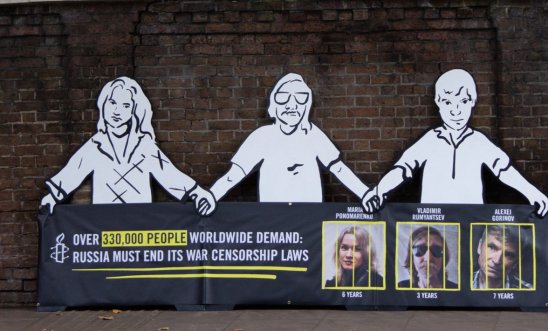
Press releases
Russia: 'No authoritarian assault will silence our fight for justice' - Amnesty responds to Kremlin ban

Russian authorities have declared Amnesty International an ‘undesirable organisation’
The decision comes three years after Russian authorities blocked access to Amnesty’s websites and shut down its Moscow office
‘You must be doing something right if the Kremlin bans you’ says Amnesty International’s Secretary General Agnès Callamard
Reacting to the news that the Russian authorities have declared Amnesty International an “undesirable organisation” thereby criminalising its activities and any association with the organisation in Russia, Agnès Callamard, Amnesty International’s Secretary General, said:
“This decision is part of the Russian government’s broader effort to silence dissent and isolate civil society. In a country where scores of activists and dissidents have been imprisoned, killed or exiled, where independent media has been smeared, blocked or forced to self-censor, and where civil society organisations have been outlawed or liquidated, you must be doing something right if the Kremlin bans you.
“The authorities are deeply mistaken if they believe that by labelling Amnesty “undesirable” we will stop our work documenting and exposing human rights violations – quite the opposite. We will not give in to the threats and will continue undeterred to work to ensure that people in Russia are able to enjoy their human rights without discrimination. We will keep documenting and speaking worldwide about the war crimes committed in Ukraine by Russia. We will redouble our efforts to expose Russia’s egregious human rights violations both at home and abroad.
“We will never stop fighting for the release of prisoners of conscience detained for standing up for human rights or for the repeal of repressive laws that prevent people in Russia from speaking up against injustice. We will continue to work relentlessly to ensure that all those who are responsible for committing grave human rights violations, whether in Russia, Ukraine, or elsewhere, face justice. Put simply, no authoritarian assault will silence our fight for justice. Amnesty will never give up or back down in its fight for upholding human rights in Russia and beyond.”
Amnesty ban in Russia
On 19 May, the Russian Prosecutor General’s Office declared Amnesty International an “undesirable organisation” under repressive 2015 Russian legislation which allows the authorities to ban arbitrarily any foreign organisation and criminalise its activities in Russia. The announcement accused Amnesty of promoting “Russophobic projects” and indicated that it was prompted by Amnesty’s work on freedom of expression and association in Russia, and its documentation and exposition of crimes under international law committed by Russian forces in Ukraine. The decision is based on a Russian law which in itself violates international law, and the language of the decision goes against facts accusing Amnesty of activities which, within its statutory documents and policies, it is prevented from undertaking.
The designation comes three years after the Russian authorities blocked access to Amnesty’s websites in Russia and de-registered – effectively closed down – the organisation’s office in Moscow. The designation puts at risk of prosecution in Russia partner organisations and individual supporters, journalists, other persons who now work with, or are seen by the authorities as supporting or promoting the organisation.
Under Russian legislation, participation in the activities of an “undesirable organiation” is punishable by law. First-time “offenses” may result in administrative fines of up to 15,000 rubles (around US$185). Repeated violations as well as funding or managing such organisations carry criminal liability and can lead to prison sentences of up to six years. The law has previously been applied to the distribution or reposting of any materials from the designated organisation, including publications and hyperlinks predating its designation as “undesirable”.
This designation places Amnesty among dozens of independent NGOs and media outlets that have been targeted in recent years as part of a sweeping campaign to suppress dissent and dismantle civil society in Russia and prevent international watchdogs and partners from providing support or showing solidarity with them. These moves are the backbone of a pattern whereby the Russian authorities are using authoritarian practices to silence voices, undermine accountability and entrench power.